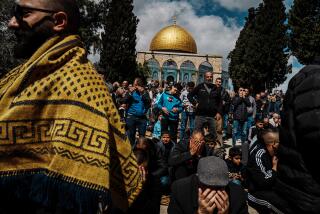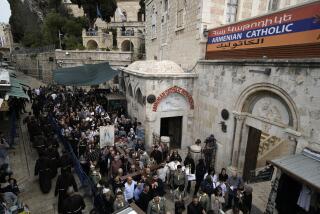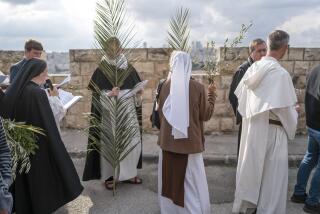Church Attendance Rises; People Praying More With Advent of War : Crisis: A turn to religion is natural in periods of turmoil, sociologist says.
- Share via
Religious impulses usually quicken in time of crisis, and indications are that such is happening in the present Middle East war. Facing uncontrollable events, people tend to reach for transcendent help.
Signs of that inclination are numerous. More people are attending worship; they are praying more, and more likely to consider faith important, according to Gallup polls in the early phases of the war.
“Some of our indicators have really jumped,” said George Gallup Jr., chairman of the Gallup International Institute in Princeton, N.J. “In certain areas, they are up dramatically.”
Church attendance at the end of January rose to its highest level in a quarter of a century, with 44% of the adult population--about 110 million people--attending worship in the previous week.
The amount of praying also has soared. Fifty-seven percent say they’re praying more than usual, with greater intensity and frequency, twice or more daily.
“That’s a big jump,” Gallup said in an interview, noting that the figure before had hovered below the mid-30 percentages. “It’s very telling that we’re finding prayer at a deeper level.
“It’s a key measure, not just organizational.”
Also, the proportion considering religion “very important” rose to 63% since the war started, a figure that had been about 55% for a decade.
Sociologist Jeffrey Hadden of the University of Virginia said “part of the lore of sociological thought” is that times of crisis are reflected in a turn to religion.
“Certainly crisis produces anxiety,” he said. “Religion postulates answers that are anchored beyond human ability. The anxiety produced in crisis is basically a situation of coping with the unknown.”
That may be dread of death, or loss of a loved one, he added. “So people turn to God or their perception of God” for some sense of peace and assurance that until “the trial passes, it’s in God’s hands.”
“Basically, it amounts psychologically to compensating for an inability to deal with the unknown,” he said. “In that sense, if it reduces anxiety and provides comfort, it makes perfectly good sense.
“It’s something natural and logical.”
He said anthropological literature has postulated that the emergence of religion itself arose out of the need to explain the meaning behind crisis situations.
Father Joseph Fichter, a sociologist at Loyola University in New Orleans, said that when confronted by fear, people want protection.
“There’s a certain utilitarian aspect about it,” he said. While consistently devout people look to religion for the “meaning of life,” Fichter said, fear-induced religion tends to look for “what religion can do for me.”
But it isn’t necessarily spurious or selfish, he said. “It’s perfectly natural for human beings to look for some protection when they’re in danger.”
Asked if that kind of faith lasts, the Jesuit scholar said:
“Unfortunately when the danger is over, people kind of turn back to themselves and don’t bother anymore. In good health, they (assume that they) don’t need God. When they’re sick, they pray.”
Oddly, the Vietnam War was accompanied not by an upturn in religious measurements, but rather a downturn, Gallup said. He noted declines in regular prayer and other religious practices in those years.
The proportion of those not affiliated with any religion rose in that period from 2% to 5%. That time was accompanied by an “anti-institutional movement,” he said.
Before that, however, the World War II period and its aftermath had witnessed a gradual increase in religious practice and membership, Gallup said. Weekly attendance rose steadily from 37% in 1940 to all-time highs of 49% in 1955 and 1958.
More to Read
Sign up for Essential California
The most important California stories and recommendations in your inbox every morning.
You may occasionally receive promotional content from the Los Angeles Times.













